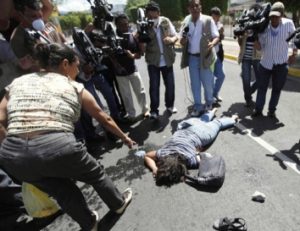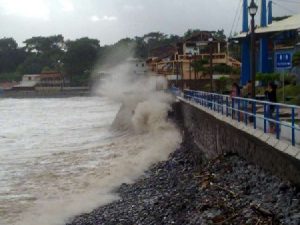Sister Cities
Crisis in Honduras, May 2010
During the month of April, the state of Arizona passed a draconian law that threatens the civil rights of all and sets the stage for a hostile environment of racial profiling and harassment of anyone suspected of being in the United States without documentation of their legal status in the country. One aspect of the Arizona law that has received almost no discussion is the role US foreign policy plays in driving millions of people from their homelands to the United States
All of us who work with El Salvador understand the clear link between US foreign policy’s often violent suppression of peoples’ attempts to transform their own societies in search of justice and opportunity and the subsequent fleeing of people across borders in search of survival and sustenance for their families. Perhaps the clearest current example of the tragic consequences of the interplay between US foreign policy and the emigration of peoples’ from their homelands is in Honduras.
During the month of April, all the key dynamics reported on in our March 31, 2010 update on Honduras continued on similar paths:
· The Obama Administration’s unflinching support for Pepe Lobo’s undemocratic, violent and repressive government, including Secretary of State Clinton’s aggressive advocacy for recognition of the Lobo regime in all major international bodies.
· The deepening of violent attacks by death squads and paramilitary forces against members of the nonviolent Honduran resistance and others organizing for social justice.
· The continued heroic and inspirational mass resistance of the Honduran people as they struggle for democracy and social justice.
· Solidarity Groups in the United States taking increasing actions in support of the Honduran people’s movement for justice and change.
President Obama, Secretary Clinton and Ambassador Lorens advocate for Lobo’s bloody regime – working to ensure the Honduran majority have no voice in their country’s future.
For an excellent ten minute video summary of the US diplomatic role in Honduras, click here
Some quick excerpts from the video highlight the key points:
FATHER ISMAEL "MELO" MORENO, DIRECTOR, RADIO PROGRESO: “The actors and the dynamics that gave rise to the coup d'état didn't do so just to stick around for a short time. Rather, these were political maneuvers for the long term. Two thousand and nine was only the start of a process we're calling a coup under construction.”
ADRIENNE PINE, PROF. ANTHROPOLOGY, AMERICAN UNIVERSITY: “Yeah, a lot of people think that since Pepe Lobo is in power that there's been some kind of resolution to what they're calling the crisis in Honduras, which is, of course, a military coup that led to a de facto military government which has been killing people right and left since last June. None of that has changed. If anything, it's intensified since Pepe Lobo has come to power”
HILLARY CLINTON, US SECRETARY OF STATE: “We think that Honduras has taken important and necessary steps that deserve the recognition and the normalization of relations. Other countries in the region say that, you know, they want to wait awhile. I don't know what they're waiting for, but that's their right, to wait.”
The violence against activists continues to escalate:
Tragically, death squad, paramilitary and state-sponsored repression against organizers on the ground in Honduras continues to grow dramatically. To share just a couple of examples:
· Amnesty International reported:
“Journalists in Honduras are at serious risk. Six journalists, all men, have been shot dead in the last eight weeks, and numerous others have received death threats. No one has been held to account and no action taken to support and protect journalists who write or speak out about organized crime, human rights violations or the government.”
· The government also acted against campesinos organizing cooperatives in Bajo Aguan, sending in large numbers of police and threatening violent action against the peasants if they did not submit to government demands. For pictures of the situation in Bajo Aguan, click here: click here
· We have also seen, similar to the experience of those organizing against mining in El Salvador, attacks on organizers fighting mining. Rights Action reported: “On April 13, 2010, 15 armed police arrived at the middle school where Carlos Amador, a teacher and founding member of the Siria Valley Environmental Committee, works. They approached the school with guns raised in attack position. When they were unable to find Carlos, the police next went to his house which they also approached with raised guns and interrogated his two minor daughters as to his whereabouts.”
C- The People’s Movement Stays Strong and Continues to Grow:
In spite of the repression and the US government’s support for the regime, the people’s resistance in Honduras continues to organize and demand justice and democracy. The movement continued its efforts to organize for a Constitutional Assembly that will allow the country to establish a participatory, democratic political system for the first time in its history. Suyapa Portillo provides an excellent description of the movement and its fight for “Una Constituyente” in her recent article in NACLA
“(The) National Front of Popular Resistance (FNRP)….(is) a large, broad-based coalition with a presence throughout the country’s regions. The resistance, as it is popularly known, is the result of a dynamic, inter-generational convergence between “new” and “old” social movements: Newer groups that push for the inclusion of marginalized people, including women, youth, indigenous peoples, Afro-Hondurans, and LGBT people, have joined the resistance, building strong links with older, more traditional unions and campesino organizations that focus on material needs and have a larger working-class membership. ….. One of the movement’s clearest and most resounding demands has been the convening of a constituent assembly to redraft the ironclad Cold War constitution of 1982. The FNRP hopes to institutionally include marginalized sectors in the government through the legal means of reestablishing the constitution. Resistance activists see this as the ultimate end of an irreversible process of awakening Hondurans to their national reality.”
Throughout the last month, the resistance continued to organize public actions. For example, on April 15th, people mobilized in “Marcha de los Sombreros. To see some great pictures from the march, click here.
D- US-based people to people solidarity with Honduras grows
Groups in the United States continued to step up their solidarity with the Honduran people, organizing urgent actions to protect human rights, contacting Congress and the Obama administration to object to the US support for the Lobo regime, organizing accompaniment delegations to Honduras and hosting educational tours by Honduran activists.
On April 9, dozens of organizations, including US-El Salvador Sister Cities, sent a letter to Pepe Lobo holding him responsible for any human rights violations related to the government’s siege of the cooperatives in Bajo Aguan. The letter stated:
“We demand the immediate cessation of the persecution, torture and murders against the peasant communities of Bajo Aguan organized in MUCA; the immediate withdrawal of the military forces and paramilitaries from the zone of Bajo Aguan; the urgent disarming of the hired assassins, paramilitary groups contracted by the land owners and Honduran oligarchy; and the immediate arrest, and application of the law, to the hired assassins, private guards, policy and military who have committed the murders.”
If you would like to support US-El Salvador Sister Cities participation in the Honduras Solidarity Network and accompany the Honduran people’s struggle for liberation, please contact us at: ringmarpeace@yahoo.com


